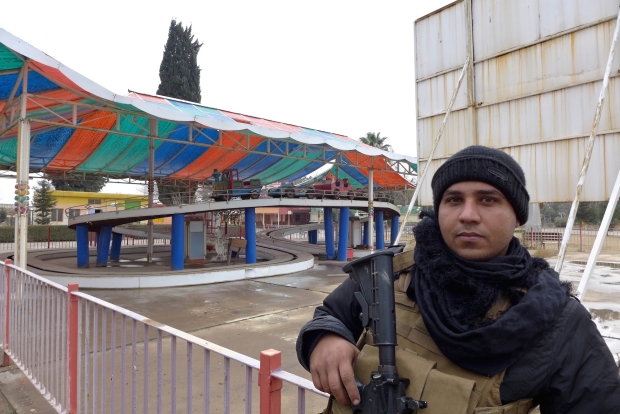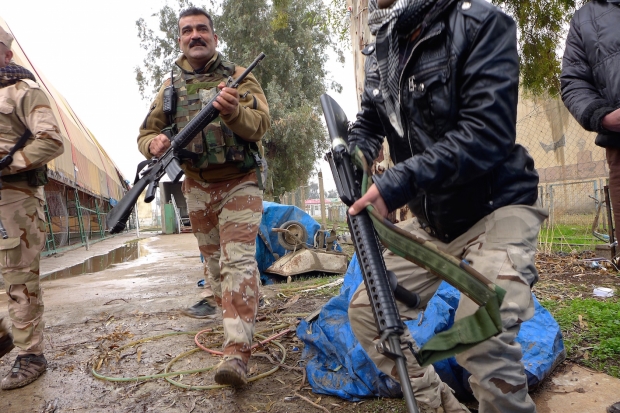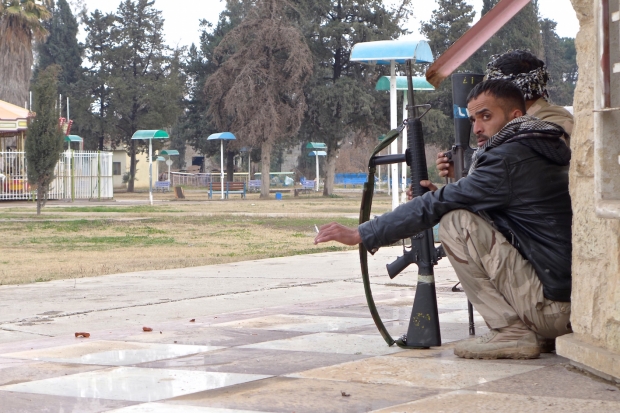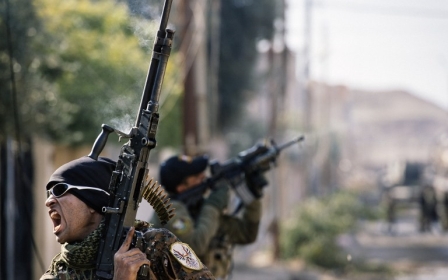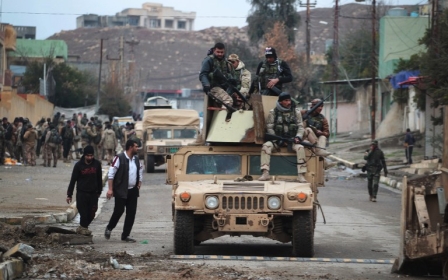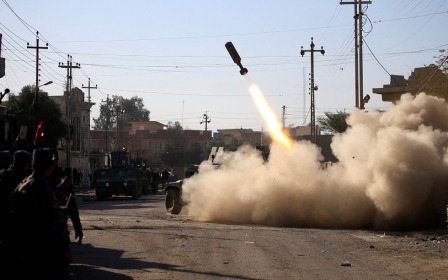Advancing through the 'Mosul Jungle' with Iraqi special forces
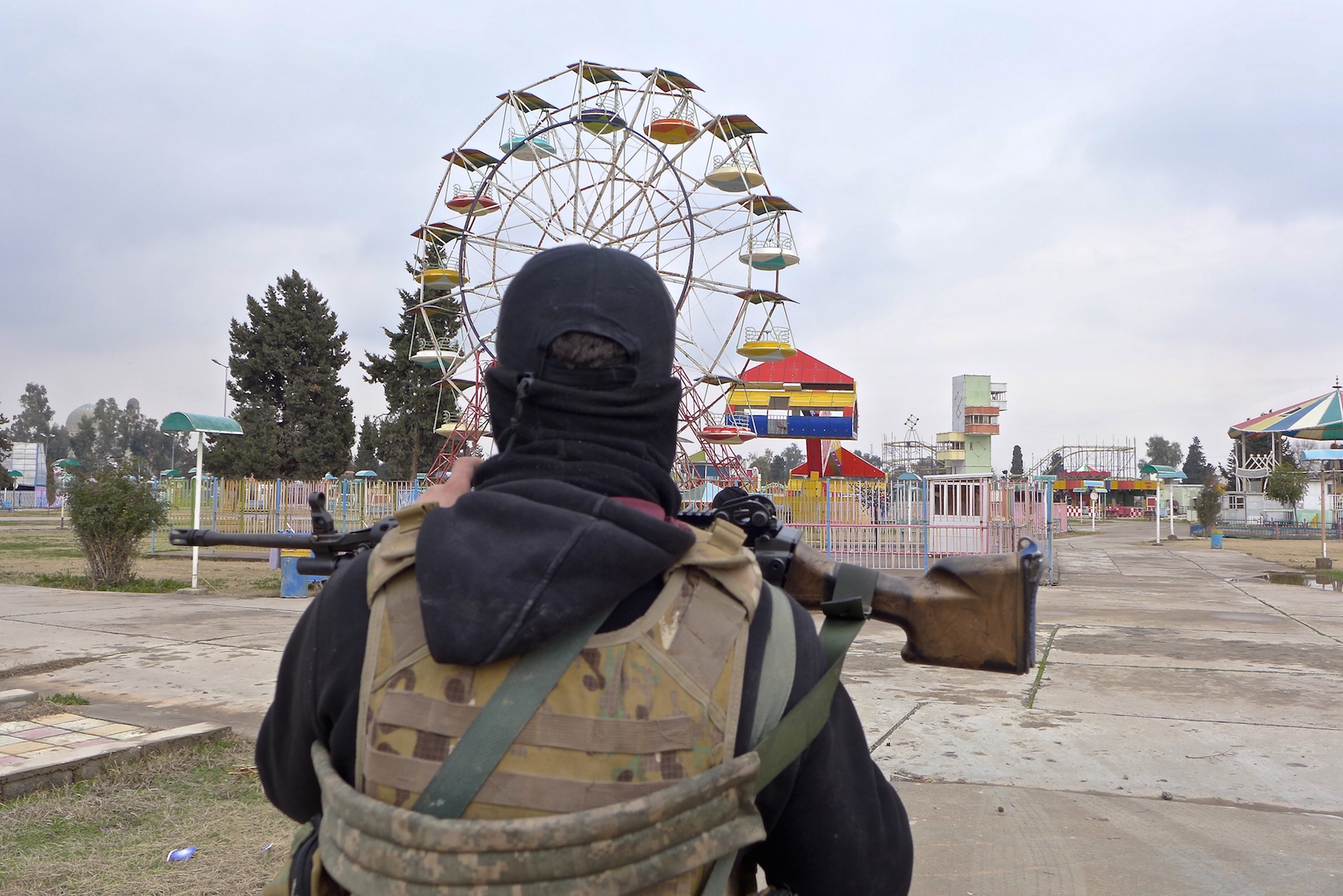
MOSUL, Iraq - In front of the towering minaret of Mosul's unfinished Great Mosque, soldiers move quickly across a deserted road, its tarmac torn open by air strikes, and drop to their knees in a muddy ditch.
They creep alongside trees that line this leafy riverside area, which Iraqi forces have nicknamed "the Mosul Jungle" since it became a hiding place for Islamic State (IS) fighters retreating towards the Tigris River. The only way to clear the "jungle" is on foot, and the small infantry unit of Iraq's elite Golden Division leading the advance are the first government forces to set foot on this turf since IS seized control of Mosul in mid-2014.
One by one, the soldiers sprint across an area of open ground and reach the locked back gates of a central Mosul amusement park. A civilian - a small man sporting the style of beard "approved" by IS - appears from behind a football pitch roofed with colourful striped canvas, acknowledges them with a raised hand and unlocks the gate. The forces move silently inside.
Iraqi forces nicknamed "the Mosul Jungle" since it became a hiding-place for IS fighters retreating towards the Tigris
The man, a caretaker in the Hay Zeerahah amusement park for children, was found walking through no-man's land that morning, carrying a white flag tied to a stick.
"We brought him in for questioning, and he told us that IS left the park yesterday, and offered to show us the way in and lead us around," a Golden Division commander, speaking on condition of anonymity, told MEE. "We questioned him, checked his ID, and visited his house to speak to his wife and children before deciding to pursue this lead."
The foliage of the Mosul Jungle, the edges of which government forces reached a week ago, has also made the area difficult to monitor accurately IS movements.
Soldiers take up positions behind trees and alongside the football pitch, while military engineers armed only with pliers move forward to break open gates and cut through wire netting, checking the ground for the explosive devices that continue to define IS defence tactics.
The land of yellow rabbits and wild dogs
After clambering through and over fencing, the soldiers sprint across scrubland towards the children's rides. They briefly confer, then split into two groups. One unit moves towards a miniature railway. The other creeps silently past a small carousel, upon which some of the plastic yellow rabbit figurines are headless, to take up positions behind a small building.
A pair of wild dogs watch from the higher ground of a main road that runs towards the river, where IS still holds positions. The sharp whizz of incoming sniper rounds sends them scattering for shelter. The soldiers barely flinch, tilting their heads to try and work out the origin of the sniper fire. One takes a quick selfie with the carousel of damaged plastic rabbits behind him. Another bullet rattles through a lamp-post just 20 metres away.
'We will never give up': Iraqi troops battle to cut IS escape to Syria
Although Golden Division support forces are keeping watch from the rooftops of houses near the Great Mosque, movements amongst the trees are hard to monitor and, now moving across the lower ground of the fairground, the soldiers are already out of sight.
A captain radios back to base and is told that armoured Humvees are waiting to move in at the first sign of any IS movements. But there is no vehicular access to the park, and the soldiers are putting more and more distance, and an increasingly complicated route back, between themselves and the Humvees.
He confirms on the radio that they will proceed further inside the fairground, to continue checking for rogue IS militants and potential improvised explosive devices (IEDs).
Playground of danger
Guns poised, the soldiers advance swiftly from behind the building and move between the brightly painted metal rides. After circling round a small children's roller-coaster, they join the other team outside a building used by IS as a women's mosque.
Pointing to a pair of two-litre, fizzy-drink bottles, with wires protruding through their taped-over tops, he whispers: "Be careful, that's C4," referring to the high-combustion agent that IS has frequently used in and around Mosul to set properties ablaze.
Shattered, mirrored windows weirdly reflect the soldiers' movements, giving the impression there is someone inside the building. The Golden Division moves through each room with stealth and obvious skill, followed by the army soldiers, one of whom says under his breath: "These guys are so much better than us."
Escape from Mosul: Liberation, desperation, interrogation
The building declared safe, the soldiers press on into the amusement park, in single file. One pauses by a fence to untie the chain of a guard dog. It slinks away, trailing the chain behind it.
An unusual silence hangs over Mosul. Areas this close to the river and the western city are normally characterised by mortar-fire and air strikes. As the soldiers fan out between the colourful rides, the painted-out faces of cartoon characters, viewed by IS as haram (forbidden), evoke a horror film.
The IS fighter on the flyer resembles a sinister version of the whitewashed pirate at one fairground ride.
The caretaker has wandered away by the time the forces, having covered more than 500 metres, reach the far end of the amusement park. They climb through a torn metal fence and crouch beside the edge of the road. Now just 200 metres from confirmed IS positions along the riverbank, they are in terrifyingly close range of snipers.
Destination reached, but don't look ...
"Be alert. There is a white car just around the corner," a voice on the radio says. The captain turns the volume down. One of the Iraqi Army soldiers stretches out his legs. "I'm tired," he says, with a sigh.
Gradually, they dart across the road and flatten themselves against a roadside building. The captain radios in to confirm their position. A military engineer tugs curiously at a wire coiling from under the door. Some of the soldiers light cigarettes. No-one dares peer around the corner towards the riverbank.
Leaving a small unit securing the new position on the main road, the Golden Division soldiers retrace their route into the amusement park and proceed back through the rides, entering the few remaining unchecked buildings. An Iraqi army captain poses for photos in front of a ride called "Crazy," where white-painted squares cover the face and hands of whatever cartoon character was once depicted there.
The reality at this central Mosul fairground was very different, according to local residents. Mainly off-limits and kept padlocked, it was only sporadically opened at weekends and twice a year for Eid holidays.
Back in front of the Great Mosque, an armoured bulldozer is manoeuvring across the battered tarmac, preparing to lead a small convoy of Humvees along the road, which could still be mined, towards the new position, which will be held by two divisions of the Iraqi Army.
Some of the waiting reinforcement troops have pulled an IS flag, now spattered with mud, from a lamp-post. They drag it around in the road, posing for pictures while holding it upside-down - to indicate disrespect - until they are summoned back by a senior officer.
Despite the successful advance, much of the surrounding Mosul Jungle has yet to be cleared, and the threat of IS snipers or an incoming mortar remains very real.
This article is available in French on Middle East Eye French edition.
New MEE newsletter: Jerusalem Dispatch
Sign up to get the latest insights and analysis on Israel-Palestine, alongside Turkey Unpacked and other MEE newsletters
Middle East Eye delivers independent and unrivalled coverage and analysis of the Middle East, North Africa and beyond. To learn more about republishing this content and the associated fees, please fill out this form. More about MEE can be found here.


